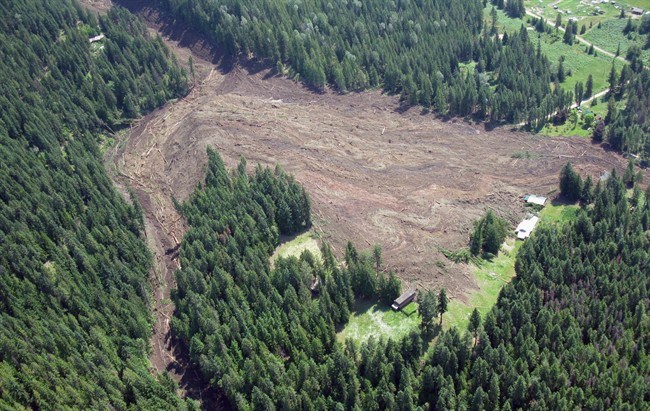VANCOUVER - When a massive landslide engulfed homes in the quiet hamlet of Johnson's Landing in British Columbia last summer, a specially-trained integrated emergency task force was among the first to respond.
Now that same team must be saved, Vancouver's fire chief said, or Canada's national and international response to crises could be seriously crippled.
Fire Chief John McKearney met with federal safety officials last week, asking the government for $1.6 million to keep the Heavy Urban Search and Rescue program afloat for the next three years.
"(It's) a last-ditch effort to salvage this national program," McKearney said in an interview, adding the funds would be spread between teams in B.C., Alberta, Manitoba and Ontario.
Funding for the existing rescue crew runs out at the end of April, McKearney said, and could mean the team won't be able to respond to national or international disasters.
"It's a huge concern," McKearney said. "We're not just a heavy-lift team or a structural-collapse team. It's really an all-hazards approach."
Public Safety Minister Vic Toews announced federal funding for the program would be cancelled after the 2012 fiscal year, as part of the Conservative government's efforts to reduce the deficit.
But McKearney said the government didn't fully grasp the consequences.
Currently able to operate self-sufficiently for up to 10 days, the Heavy Urban Search and Rescue team would have to rely on host communities for lodging, food, transportation and supplies if funding is cut — something the local municipalities aren't always equipped to do in major catastrophes.
The integrated task force is currently made up of medics, firefighters, engineers, and search and rescue crews. It co-ordinates efforts of emergency responders across four provinces in the event of major floods, landslides, earthquakes, building collapses, or other disasters.
Their training is unique, McKearney said. Members of the heavy-urban response team have the know how to save those trapped in confined spaces, tunnels and mounds of rubble.
"We have the ability to produce 30,000 litres of fresh water a day from swamp water — all these things that really mitigate most of the disasters," he added.
What makes the service so crucial, however, is the way four heavy urban teams collaborate across provincial borders and lend their specialized skill set to already-established police, fire and emergency departments in the areas they serve.
"If we have something major ... we can rely on, talk the same language, and (have) the same position and same equipment as the three other heavy teams," McKearney said.
It's taken years to establish standardization of skill sets across the provinces, the fire chief said, and Canada risks forfeiting that "plug-and-play approach" if they're unable to continue annual training and collaboration.
"That truly will be lost — that really is the sad part about it," he said. "We would be moving from about a $3-million cache ... down to a $1-million cache of equipment. Our team size would move from just over a 125 staff to just under a hundred."
Public Safety Canada issued an email statement in response to questions from The Canadian Press regarding future funding for the program.
"Most emergencies are local in nature and are managed by municipalities or at the provincial or territorial level," said the ministry's media spokesman, Jean Paul Duval.
Duval said the elimination of urban search and rescue funding reflects the substantial increase in local emergency preparedness and response capacity over the years.
"Public Safety Canada is focusing its resources on its core program activities," Duval added. "In the event of a large scale emergency that overwhelms the capacity of a province or territory, the federal government has always been, and will continue to be, available to assist with the response and co-ordination."
McKearney said he's optimistic after "very positive" meetings with Gary Donovan, the executive director of the National Emergency Preparedness Directorate, but he's still waiting for his phone to ring with news.
He added there are many uncertainties surrounding the future of the team beyond the federal government funding that's still needed, because the provincial governments will also have to re-commit funds.
McKearney said the teams are also looking for private-sector funding to keep the task force alive long term, but for now, government funding would provide a temporary fix.
Prior to the end of the fiscal year in April, the cost of urban search and rescue teams was shared with provinces as part of the Joint Emergency Preparedness Program.



